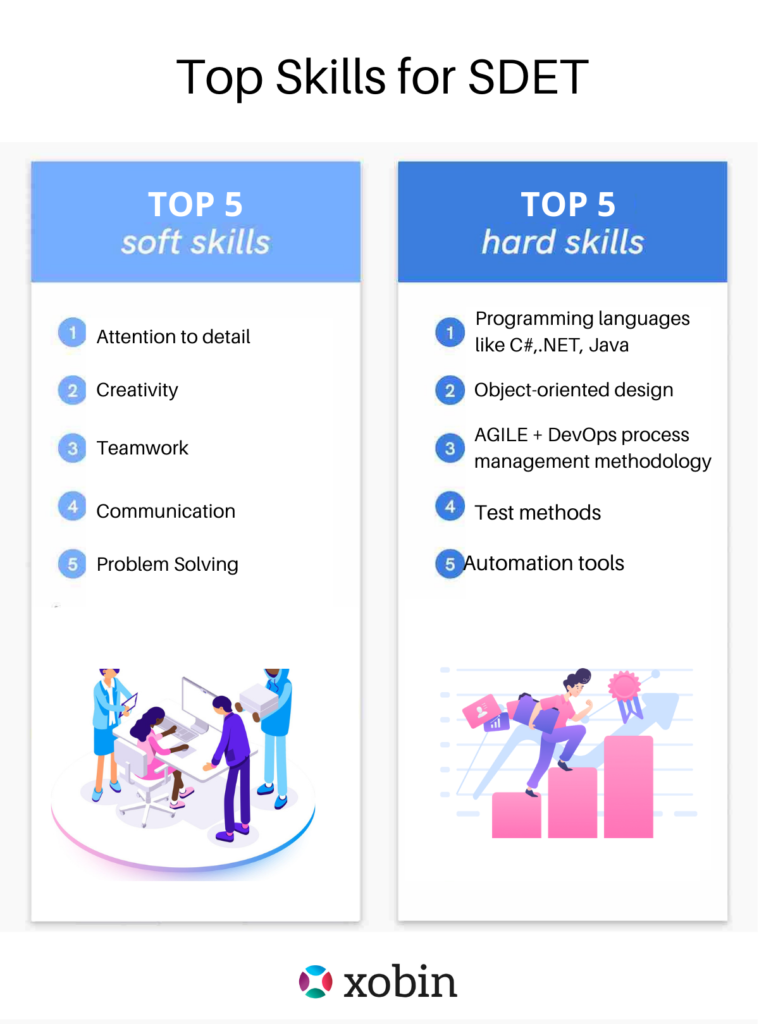Top interview questions for SDET
A Software Development Engineer in Test or SDET is someone who can work equally and effectively in both development and testing roles. They are responsible not only for writing code but are required to test the code as well.
The educational requirement for an SDET is:
- A bachelor’s degree in Computer science, software engineering, or related field, in some cases employer, may prefer a master’s degree.
- Certification in some of the technical skills required
Are you in a hurry to get started? Download the SDET Interview Questions and Responses Toolkit.

Hard Skills
Use these questions to identify a candidate’s technical knowledge and abilities

Soft Skills
Use these questions to assess a candidate’s personality traits and cognitive skills
What to look for while interviewing for a Software Development Engineer in Test or SDET?
The skills required for an SDET position are expertise in programming languages like C#,.NET, Java, and others, experience with AGILE + DevOps process management methodology. Therefore, look for a candidate who has knowledge of all these.
Here are some of the in-demand skills for a Software Development Engineer in Test or SDET

Role-specific skills to look for: Programming languages like C#,.NET, Java, and others, Object-oriented design, AGILE + DevOps process management methodology, test methods, automation tools.
Soft skills to look for creativity, teamwork, attention to detail, problem-solving, and communication.
Pro Tip: Always screen before your interview. Use Online Assessment to screen applicants for an SDET position before blocking your time for an in-person interview.
Questions to ask while interviewing a Software Development Engineer in Test or SDET
We have compiled a set of questions with the help of 70+ hiring managers at different organizations.

Top Role-based interview questions for SDET
What are the different components of a test plan?
Purpose of this interview question:
This question can be asked to validate the basic testing concepts and mindset since these terms and documents are something that SDETs, should know.
What to listen for:
- Listen for the various components of the test plan.
Can you design a platform like Instagram, Twitter, or Facebook?
Purpose of this interview question:
This question is designed to test the candidate’s system design-related skills since they are the major technical skills required for this job position.
What to listen for:
- Top candidates would discuss points like DB schema, Video, and image hosting servers.
What is risk-based testing?
Purpose of this interview question:
Knowledge of different software testing-based concepts is crucial to a job position of an SDET.
What to listen for:
- Listen for the specific terms that would explain risk-based testing.

How to screen SDET for soft skills
Why do you want to work for our company?
Purpose of this interview question:
This question is designed to know what kind of information does the candidate has about your company culture and what has excited them to join your organization.
What to listen for:
- Listen for the detail about what has driven the candidate to work for your organization.
What skills do you think are necessary for this job role?
Purpose of this interview question:
Since software developers rely on a combination of technical knowledge and transferable skills to be successful. Therefore it is important for an applicant for this role to show the required skills.
What to listen for:
- Look for evidence of the required skills for this job role.
Do you have any questions for us?
Purpose of this interview question:
The question is designed to know how interested the candidates are in your company.
What to listen for:
- Top candidates would ask questions and show interested in the job and company-related details.

Start Optimizing your SDET hiring today
Find and hire talent with confidence. If your candidate doesn’t know the answer to the above questions and you’re hiring for a Software Development Engineer in Test or SDET position, then they’re probably not a great fit.
Read our additional hiring guides



